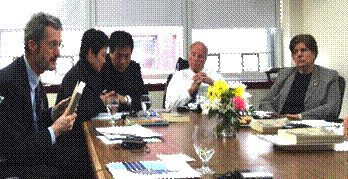Corporate Social Responsibility—From Suzhou to New York
Following the CSR conference held in Suzhou in October 2014, Good-Ark’s Chairman, Nianbo Wu, was invited to attend the Global Conference on Corporate Social Responsibility and Corporate Shared Values held at the St. Thomas Aquinas College (STAC) in New York. Attending the conference were the heads of departments of STAC and their joint esteemed associates from South Korea, Malaysia and the United States. They represent professionals from educational, corporate and government background, bridging Eastern and Western cultures to discuss important global issues related to CSR and CSV.
Dr. Margaret Fitzpatrick, President of St. Thomas Aquinas College, spoke beautifully in her opening speech about how we might speak different languages, have different skin colors and come from different cultural backgrounds, but we could nevertheless have a heart-to-heart exchange and find common values and mission. This global conference is the first step toward bringing the culture of the sages to the world to benefit all mankind. She cited a quote from the book, Governing Principles of Ancient China , that says: “If you are planning for one year, grow the five cereals. If you are planning for ten years, grow trees. If you are planning for a lifetime, educate people.— Guan Zi”
The second quote that she cited from Volume 2 of the same book was: “Understanding others is wisdom. Understanding ourselves is enlightenment. To conquer others is power; to conquer ourselves is deemed formidable. One who knows contentment is wealthy; one who strives to perform kind deeds is purposeful. One who acts according to his innate kindness shall prevail. The physical self may die but the spiritual self lives on, and that is true longevity. –Lao Zi ”
These words, which were spoken 2,500 years ago, can still resonate truth today. So little was said, but so much was expressed. Dr. Fitzpatrick, who is a tenured professor in education and the sciences, represents the college on a national board of 19 higher education institutions and was one of the 15 presidents to serve on the National Presidential Board for college athletics. She would be well suited to share this sentiment with the audience.
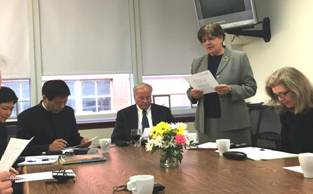
Quotes from the Governing Principles of Ancient China, Vols. 1 and 2
Dr. Keith Darcy is Executive Director of the Ethics and Compliance Officer Association (ECOA). ECOA is the largest association exclusively for ethics and compliance executives, with over 1,300 members across six continents. Darcy currently serves as Chairman of the
1
Board of the Better Business Bureau Foundation. He is also Chairman of the Advisory Board of the National Center for Ethics and Social Responsibility at St. Thomas Aquinas College, and is also on the Advisory Board of the Notre Dame Deloitte Center for Ethical Leadership. Both Dr. Darcy and Dr. Fitzpatrick attended the Suzhou conference last year and were deeply impressed by Mr. Wu’s commitment and beliefs to prioritize people before profits.
Dr. Darcy is an ardent student of philosophies and cultures who found common values in diversities. We felt his deep sadness whenever he spoke of the story of Chief Seattle, about the demise of the earth if we do not realize that the earth does not belong to man but man belongs to the earth, and all things are connected like the blood that unites us all. Man did not weave the web of life; he is merely a strand in it. Whatever he does to the web, he does to himself. He was very supportive of Mr. Wu’s idea in creating a warm family feeling for his employees and cited a message from Mr. Wu that says: Our core corporate value lies in the happiness of our employees and the appreciation from our customers! As one of the most important driving forces in a developing society, corporations have become the backbone of the communities to which they belong…We strive to fully undertake our social responsibility, building a green and sustainable business, leading as an example of a Happy Enterprise, and ultimately achieving the shared vision of ‘home’.” Indeed, home is where our story begins.
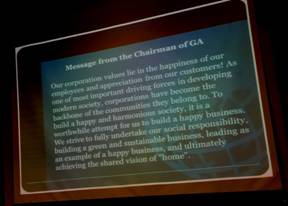
Dr Keith Darcy – Message from the Chairman of Good-Ark
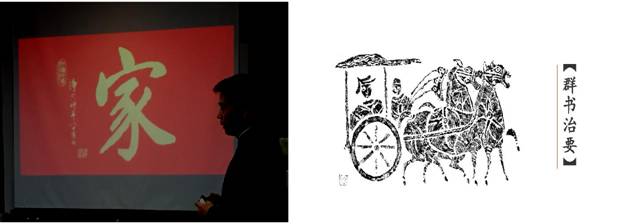
Cultivating oneself, managing the family, governing a country and bringing peace to the world
2
In the traditional Chinese beliefs of “family” and the “family code of conduct”, “family” is a social unit, through which one can find life-long security and support. In Confucianism, character building embodies cultivating oneself, managing the family, governing the state and bringing peace to the world. Family is an important social institution that can unite hundreds of family members to live harmoniously, respectfully and caring for each other. They may have different family codes of conduct but in substance the rules are set up based on the Five Moral Relations1 , the Five Constant Values2, and the Eight Virtues3. A child learns these values by seeing the good examples exemplified by the parents, and grow up to become a confident person who knows how to balance one’s material needs with spiritual imperatives.

The Eight Modules of a Happy Enterprise
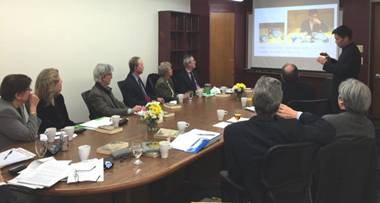
“Zero Food Waste” campaign led by top managers
Likewise, a business enterprise can inherit the spirit and functions of a traditional family by engaging family values to transform, educate, and benefit all people. Business leaders can be likened to be the elders of a clan who respect, love, help, and take care of their employees, providing them with a sense of belonging, and enabling everyone to treat each other as a member of the extended family. The key to building a business based on family culture must
![]()
- The Five Moral Relationships—Parents love and children are filial; elder siblings show kindred spirit to the younger siblings and the younger siblings return with respectfulness; husband is righteous and wife is supportive; superiors are benevolent and subordinates are loyal; friends are trustworthy among friends.
- The Five Constant Values—benevolence, righteousness, propriety, wisdom, trustworthiness.
- The Eight Virtues—filial piety, fraternity, loyalty, honesty, civility, righteousness, integrity and shame.
3
employ education as the basis of change and reform. A company is like a school that teaches employees to understand the principles behind filial piety and kindred spirit, and respectfulness toward teachers. When an individual is respectful of his or her parents and teachers, seldom would he rebel or become unreasonable toward their superiors. Once this principle is understood, one learns to become a responsible person, and become considerate toward other people.
In the book of Great Learning, it is said: “from the ruler of the land to a common man, all have to cultivate their character.”
Mr. Wu’s presentation brought great interest to the participants and they came to a unanimous conclusion that the success of Good-Ark Happy Enterprise cannot be separated from the fact that Mr. Wu, as the majority share owner of the company, has taken the lead to fulfill all the promises that a corporate family culture can bring. Since he founded the business until today, Mr. Wu not only possessed the technical expertise and visions required to operate an electronics company, but he also has the resolve to venture into a Chinese management style that was unprecedented in China. He loves his staffs as if they were his children. He provides education opportunities for them to learn about ancient wisdom. He helps them to understand and fulfill their moral duties, naturally influencing them to grow into responsible persons who will not only contribute greatly to the wellness of their families but also to the wellness of the company, society and world peace. This is the vision of the western CSR campaigners and Good-Ark, without using too many terminologies, has moved forward years ahead of them. This intrigued the experts.
Dr. Michael Magee, President of Positive Medicine Inc. was impressed to hear that Good-Ark’s education content, such as pre-natal education and early childhood education, came from ideas that were passed down from thousands of years ago. He thought that Mr. Wu was very genuine in wanting to help his employees to become fulfilled and socially responsible people. This was different from other companies that also offer family-like working environment but only to replace one’s personal family with a corporate family.
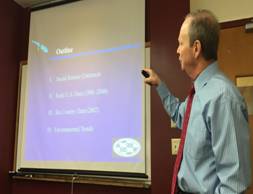
Dr. Georg Kell, Executive Director of the UN Global Compact, felt that Mr. Wu was resolved to run a corporation based on ancient Chinese management thinking and wonder if this age-old concept can be passed down to his successors. In answering this, Mr. Wu said, “If our education content and approach is effective, we will be able to ‘make things simple.’ We merged related departments and encourage workers to help each other and reduce the number of hierarchical middle management.” Isn’t this the “flat management” or “flat organization” that the West has talked about frequently but found it difficult to carry out? Dr. Kell held the Governing Principles book in his hand and promised that he would read it and absorb morewisdom from the ancient Chinese thinkers. He also invited Good-Ark to join the Global Impact family that has 8,000 corporate members from 145 countries aimed at promoting environment-friendly and responsible businesses.
4
Dr. Kell holding the Governing Principles of Ancient China in his hand.
During lunch break, we were surprised by the mostly vegetarian dishes that were both good to look at and delicious to eat. Dr. Fitzgerald said it was specially prepared with Mr. Wu in mind as they respond to his call to eat more vegetarian meals to lower carbon emission.
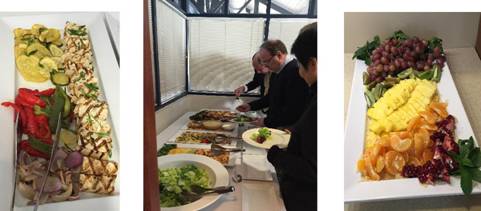
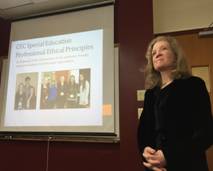
Dr. Elizabeth Finnegan from the School of Education introduced the history of U.S. special education policies and the shared values of U.S. special education communities. Today, schools in the U.S. must provide disabled students with appropriate access to the general curriculum and effective instructional support. The School nurtures students to become familiar with the system and possess the knowledge, skills and the compassion required to help special needs students, in addition to doing research and
device programs that can improve special education.
The acting CEO of Chung Hua Cultural Education Centre, Malaysia, Ms Pohlan Song, brought to light the twelve virtues that are the core values of traditional Chinese culture. These virtues are—Xiao (filial piety), Ti (fraternity), Loyalty, Trustworthiness, Propriety, Righteousness, Humility, Shamefulness, Benevolence, Love, Peace and Harmony. The Chinese civilization does not demand foreign cultures to yield to its magnificence. It is a culture that seeks to accommodate differences. It can be likened to a vast ocean that accepts water from all rivers that flow into it. These virtuous principles are universal and hold truth across all races,
nationalities and religions. Malaysia is a multi-racial, multi-cultural and multi-religious country but all could accept these values. Every day, one should "think kindness, say kind words, do kind deeds and be a good person." Always be grateful, sincere and respectful. This may sound like a cliche that can easily be brushed aside, but it rings so much truth in our lives. It seems that the more we desire for, the less we get. The ancients may have lots to teach us.
We need role models to establish people's confidence in reviving age-old wisdom and see our lives in a new light. Ms Song was thankful to Mr. Wu for his guidance. He exemplifies leadership that not only teaches by his words, but also by his actions. Since Chung Hua Centre imparts the knowledge that Good-Ark implements in their operation, it is even more important for the Centre to practice what they teach. Like Good-Ark, the Centre aims to establish a harmonious family role model, so that they have the confidence to bring the sages' teachings to the world to benefit mankind.
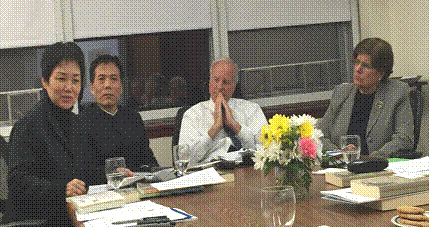
Song Poh Lan on Sages’ Culture Shaping Civilization
Dr. Darcy and Dr. Fitzgerald made some reflections after their visit to Suzhou last year. Initially, they thought the U.S only have 350 years of history compared to China's 5,000 years of history, so naturally, the two countries would have many differences. However, on further thinking, everyone can understand and long for the warmth of a family, or what we call "home." Building a business on the "home" concept is an idea worth exploring. The participants of this conference, including the CFO of the Bacardi Inc. would like to visit Suzhou Good-Ark to see first hand how this is done. This is a sign that the Happy Enterprise has started to bring the culture of the sages to the world, and moved one step forward to bring benefits to mankind.
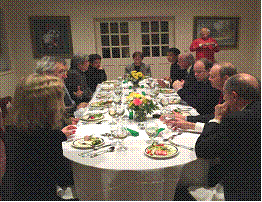

Discussion during dinner Friends sharing the same dreams
Source: Chung Hua Cultural Education Centre, Malaysia
5

